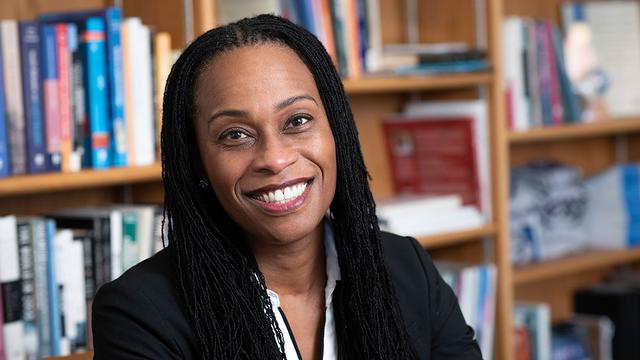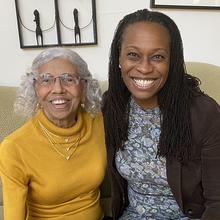Nisha Botchwey joined the Humphrey School of Public Affairs as its new dean in January 2022. Previously, she was a faculty member and administrator at Georgia Tech for nearly a decade, and was director of the Georgia Tech Healthy Places Lab.
A native of Jamaica, Botchwey is the first woman of color and immigrant to lead the School. We asked her to reflect on her journey to this leadership role.
On her background:
I was born in rural Jamaica and raised between there and Miami, Florida. My parents migrated to Miami when I was a little girl. When I began kindergarten in Miami, I was placed in an ESL (English as a Second Language) class, because even though I spoke English, I had a thick accent that my teachers couldn’t understand. My mother pushed back on that decision and I was moved into a regular classroom.
During my childhood I spent a lot of time in Jamaica. My parents would send me to live with my grandmother and cousins over summer breaks, so they could work through the summer in the U.S. without worrying about child care.
I graduated high school in Miami as valedictorian of my class, and was the first in my family to attend college. I went to Harvard University for my undergraduate degree. I had two high school friends who were attending Harvard and they encouraged me to apply. They were also of Caribbean background and were thriving there.
I completed my bachelor’s degree in environmental science and public policy at Harvard, then pursued my master’s and PhD in planning at the University of Pennsylvania. Later on I became interested in public health and earned a master’s degree in public health from the University of Virginia.
On her interest in public affairs as a first-generation college student:
Public affairs is the infrastructure by which the policies and legislation that govern our lives, our communities, and our organizations are established, tracked (surveillance), enforced, and revised. It requires an understanding of where individuals and societies want to advance and what’s been tried in the past.
Public affairs requires engagement with a variety of individuals, communities, and organizations to gain this understanding, to communicate and then support implementation of the right path forward that’s been determined collectively for that moment, then determined again for the next.
As a first-generation college student, and as a curious kid who asked ‘why’ about everything and always had more questions than answers, I wanted to understand the rules of our society, the rules of “the game.” Then I would be able to see and understand the many rules that were invisible to me, and help other people do the same.
My dad repeatedly told my sisters and me that education and hard work were the keys to success, the keys to understanding these rules. As Black immigrants to the United States, my sisters and I started well behind the starting line due to our limited familiarity with American culture, limited financial resources, and tangible societal bias we faced simply because of what we looked like and how we sounded.
In addition to hard work and education, my mom reinforced with us that we needed to put in more time to overcome these hurdles and relationships with people and organizations who can decode, advise, encourage, correct, mentor, and sponsor.
Dad and mom’s keys are also the keys for effective public affairs work—working hard and being committed to matters, educating yourself and others about the topic, putting in the time to get the work done and overcome hurdles, and operating in strong relationships with stakeholders who will help you advance the work.
On being the first woman of color and immigrant to serve as dean:
It’s a tremendous opportunity to be the first person of color and immigrant in this position. For me it's a celebration and a commitment to what Hubert Humphrey worked on throughout his career.
I have family and friends around the world. Now they see their sister, cousin, niece, friend, auntie named to this position and they think, “If Nisha is there, then I can be there, too.”
It wasn't easy for me. It was a tremendous lift. But it was a lift that was done in and with community. I’ve benefited from tremendous relationships and support throughout my life – from my aunties, Girl Scout troop leaders, study group partners, pastors, mentors – that's allowed me to be resilient throughout my career and thrive here, today, at the Humphrey School.
It's a nod to what my dad says: “The most important thing is God. But after that it is education, education, education.”
On the importance of higher education:
My father had to stop going to school when he was seven years old to help support his family. He swore that his children would not have to sacrifice like he did, and that we would have the very best education he could provide.
My education is important not just because of the value my parents ascribed to it. It is important because an education opened the world to me. It exposed me to new ideas, new ways of thinking, and the realization that I don't know everything. Because of my education, when a problem is presented to me, I can research it and engage others who have other perspectives so we can get to the right solution together.
Education is not just for the individual, it's for the broader society. Societies and communities that are not advancing don't have the resources to understand where they come from, where they're going, and how best to move forward. How do we engage with decision makers? How do we hold them accountable to the best approaches that allow all parts of society to advance?
On her academic interests:
I actually have had several pivot points in my academic career that led me to focus on health equity and the built environment. The main thread throughout has been my curiosity and pouring into areas that matter the most to me and my community.
When I was an undergraduate student at Harvard, I became interested in marine biology, which motivated me to study the coral reefs in Montego Bay in Jamaica, where I spent so much of my childhood. I documented how the reefs are under threat because of high nutrient loads, climate change, overfishing and other factors.
One day I was diving in the Montego Bay Marine Park, collecting samples near the reef, and on the shore nearby I was struck by the sight of an all-inclusive resort sitting right next to a dense squatter community. I realized that the onshore policies, the development practices, and the resulting behaviors were the root causes of the damage to the reefs. I decided I wanted to understand and help change those policies to help my reef rebound. That led to my pivot to environmental planning in graduate school at the University of Pennsylvania.
While I was at Penn, because of the challenges that were so prominent in North Philadelphia, I switched my focus from the well-being of the marine ecosystem to that of the North Philadelphia community. My research focused on understanding how community development corporations and faith-based organizations provide a safety net for the public by supporting people and families who couldn't access the resources they needed to thrive or to improve their communities. I started looking at programs provided by community organizations, and honed in on health services.
Then, both my parents developed type 2 diabetes. My father is an active person, and my mother was a nurse, and I thought, ‘If they can develop this disease, then there has to be something else going on.’ So my focus shifted again to community health and well-being.
The final pivot in my academic career came when my husband and I became parents to three amazing children, and I became more tuned into the inequities in access to safe and appropriate physical activity options for children and young people, especially in urban areas. So I shifted my focus to youth advocacy for health and well-being.
I believe in the power of youth to transform their world, our world into a better place. I sought to help amplify the voices of our young people, to equip them with the tools they need to develop evidence-based campaigns, and to make positive change in their communities.
On community engagement:
I believe, and I was raised by my mother and grandmother, to “do as much as I can, for as many people as I can, for as long as I can.” And I have followed that advice wherever I’ve been. That’s why I changed my research focus from the coral reefs in Jamaica to the community where I was living, Philadelphia, when I was in graduate school.
I realized that Philadelphia needed me in ways that were more immediate. I coordinated with my husband and friends to set up a nonprofit to serve the community. It allowed us, as a network of young graduate students, to hone our skills and immediately invest in individual and community well-being.
Educating young people on how to identify the roots of a problem, then develop a strategy to solve that problem, is the way I have chosen to do what my mother and grandmother said.
If our students are looking to their communities as a place to serve, the Humphrey School needs to help provide that vehicle for service. This can be right in our backyard and around the globe, and in ways that align with the imagination and commitment of our students, in public, private, and governmental sectors.
On leading the Humphrey School:
The Humphrey School is a very special place. Its mission statement focuses on preparing new leaders to advance the common good in a diverse world. I fully stand on that, but I want to push it further to advance the common good in 'our' diverse world. ‘Our’ communicates connections, ownership and relationships with everyone around us.
This is the right time for me to be here. I have perspective, skills, and experiences to bring to the table, and I'm excited to be here. I chose to come here so I can engage with everyone who is working to improve lives and opportunities in our communities through policy, systems, and environmental change.
This School is a place where discourse happens; where we agree, we disagree, and we realize that we don't know it all. We’ll work together to figure out how to produce what will work best for all of us, and we partner with local, state, national and international communities to implement those solutions. That's what we do and will continue to do. Our work has and will continue to change the world, and I'm thankful to have the opportunity to be part of it.
The mission of the Humphrey School is not going to be realized only by my efforts as dean, but by the collective efforts of the whole school community. There’s a saying, “If you want to go fast, go alone. If you want to go far, go together.” We have a far way to go and together is the way.



